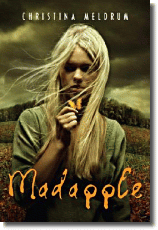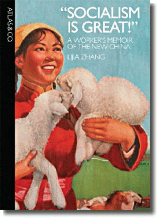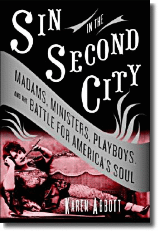Ana Siljak
Ana Siljak is Assistant Professor of Russian and East European History at Queen's University in Ontario, Canada.
Her new book is Angel of Vengeance: The "Girl Assassin," the Governor of St. Petersburg, and Russia's Revolutionary World.
Siljak responded to a few questions about the book which were put to her by the political scientist Cary Federman, author of The Body and the State: Habeas Corpus and American Jurisprudence and a professor in the Department of Justice Studies at Montclair State University:
Federman: Can you tell the readers of the Campaign for the American Reader what your book is about and what prompted you to write a book on an assassin?[Editor's note: I added a two-part question of my own to the Q & A.]
Siljak: The book is, on the simplest level, a story about Russia's first female terrorist and her dramatic, history-making trial. I had come across a shorter version of Vera's story in a book on Russian revolutionary women, and I decided almost on the spot that this was a great subject for a book. I wanted to know how an ordinary person like Vera decides to kill a government official, and I wanted to know why a jury would acquit a confessed assassin.
When I began to delve more deeply into the background, I realized that the superficial drama was just the tip of the iceberg. And so the book became a more complicated tale of nineteenth century Russia: of noblewomen turned terrorists, of literature and life in Russia, of reform and reaction in a rapidly modernizing state on the outskirts of Europe. I had uncovered an entire world of revolutionaries, and I just had to describe this fascinating cast of characters that sought (and ultimately achieved) the destruction of an entire society.
Federman: Vera Zasulich was a female assassin. What I found most interesting was that she was not the only female assassin in Russia at the end of the 19th century, though female assassins remain a distinct minority in all countries. How do you account for this? Is there something about the Russian political order that produces female assassins or is there something about females within the Russian political order that made them choose assassination and revolutionary activity?
Siljak: In part, Russian women became revolutionaries because the ideology of Russian socialism was decidedly feminist. In my chapter on the "new people," I describe how socialist utopias sought to liberate women from the shackles of traditional roles and give them opportunities to pursue self-fulfillment. There is no doubt that women like Vera, who wanted to do something in the public sphere, were very limited in their choice of profession: they could become governesses, teachers, or midwives. Socialism, as Vera herself put it, allowed a girl to be "equal to a boy."
But this is only part of the story. Most of the memoirs of female socialists do not dwell on this aspect of their turn to socialism. Instead they, like their male counterparts, were swept away by the quasi-religious promise of the socialist movement: that the existing oppressive and miserable social order could be swept away, and a whole new world of peace and prosperity could arise to replace it. Indeed, many women rejected purely feminist ideals as petty, especially in the face of the suffering of the Russian masses, male and female. Socialism would resolve the "woman question," much as it would resolve every other.
A final note on this question -- women were a minority in the Russian socialist movement as well. But everyone (myself included) is fascinated by them because they seem exotic -- we think women are not supposed to be ruthless assassins!
Federman: The other great shock of your book is that Vera was found not guilty, but not because of her state of mind. She was thought sane and not responsible, a peculiar pairing. Can you tell us about the trial and its verdict?
Siljak: There is a complicated answer to this question, and a simple one. The complicated answer has to do with the particular formulation of Russian law at the time. In Russia, as in some other European countries, intent was a crucial component of guilt. Thus, it was not enough to prove someone had committed a particular act to determine whether he or she was "guilty" of that act. State of mind was crucial. For instance, Vera was charged with murdering Trepov, even though Trepov did not die, because as her indictment put it, he survived "only for very particular reasons, unforeseen by the defendant." For the very same reason, the jury found Vera "not guilty." She never denied that she shot Trepov, but her attorney skillfully argued that she did not "intend" to kill him. It was a kind of "crime of passion," in which a distraught and tormented Vera sought to call attention to Trepov's crimes.
The simple answer is that she had a very good lawyer. Alexandrov very eloquently framed the story as one of a young, innocent girl attacking an inhuman, brutal tyrant. After Alexandrov made his case, I think the jury simply thought Trepov got what he deserved.
Federman: The killing of Trepov is a strange affair. He certainly wasn't a minor official, but he was not the only symbol of government oppression, either. And his crime, the torture of Bogoliubov, was hardly exceptional. How, then, should we understand the assassination? Was it a shot for human rights in Russia by the oppressed or the act of a mentally unbalanced person (who you describe, at various points, as "depressed," "bitter," and having "dark moods)?
Siljak: Certainly, Vera's lawyer did his best to suggest that Vera shot Trepov because her sensitive, feminine soul was tormented by Trepov's barbarous act against a political prisoner. In the trial, Vera's act was presented as a dramatic, but isolated case. In truth, Trepov was merely the first target in the Russian revolutionary "turn to terror," which sought to create the preconditions for revolution by assassinating key figures in the government. Other revolutionaries were plotting Trepov's death, Vera just beat them to it. Alexandrov left much out of his account of the attempt on Trepov's life because he correctly surmised that the truth would not go over well with a jury.
For Vera and her comrades at the time, terrorist attacks on government officials were the key to undermining the power of the state. A series of assassinations, carefully planned, would terrify government officials, undermine the authority of the Russian bureaucracy, and (they supposed) empower the oppressed masses to rise up against the existing social system. So terrorism was a calculated strategy, and, for a time, Vera supported it wholeheartedly.
Federman: Without giving away the ending, Vera turns away from assassination. Can you explain some of the reasons for this change? Specifically, did she come to realize the futility of assassination or was it part of a larger understanding of how to change society?
Siljak: Yes, Vera becomes the first Russian terrorist to renounce terrorism. I think she did so for two reasons. The first, and perhaps most powerful, was her growing moral revulsion toward her act. Not that she had pity on Trepov -- but she felt that the act of killing a man was not one to be undertaken lightly. When the "turn to terror" was in full swing in Russia, terrorist attacks increased at an alarming rate, as did government executions of terrorists. When Vera read the news about one or the other, she felt personally responsible for encouraging so much killing on both sides.
The second reason for her turn against terror was more ideological. Eventually, she became a Marxist, and believed that revolution could only occur with the full participation of the working class. Terrorist violence was ineffective -- a few isolated individuals acting against other isolated individuals. Terrorism did not inspire the sweeping, massive, transformative revolution she desired, instead, as she put it, it was a "spectator sport."
Federman: Finally, the book is largely about the connection between the desire for revolutionary change and literature's influence on manners and thought. Zasulich herself is a writer, and all the main characters in the book live and breathe for literature. Today, however, the writer doesn't have such power to influence events. Many of us would say that is clearly a benefit, but others might view the change as a tragic loss of literature's hold on the public imagination. How do view this, in light of the life that Vera Zasulich led?
Siljak: The love for literature in nineteenth-century Russia is, I believe, unparalleled in history. Literature was politics, it was philosophy, it was religion. I might add that literature was not just revolutionary -- the conservative and religious Dostoyevsky and the pacifist and populist Tolstoy were also greatly influential in their own day.
Today, television and the internet have completely eclipsed literature in their power to influence opinion and behavior. Modern people live and breathe what they see on their screens. To my mind, this is a bad thing because of the passive nature of modern media. Books engage the imagination and inspire reflection; and they have the power to address, in depth, the political, philosophical, and religious questions of the day.
Ultimately, however, I am a firm believer that the power of literature or any other type of media is not good or bad in and of itself. Only the content can be judged. Vera was deeply influenced by the radical literature of her day, and this led her to terrorism. But one should blame radicalism, and not literature, for this fact.
Zeringue: What question do you wish someone would ask you about your book but no one has asked? And what's the answer?Read an excerpt from Angel of Vengeance, and learn more about the book and author at the publisher's website.
Here is a question that I found very important while I was writing the book: "Why did the Russian terrorists embrace martyrdom so easily, even if they were self-professed atheists like Vera?"
For my research, I read a great many memoirs and biographies of Russian terrorists. Their fierce desire for martyrdom struck me again and again. Vera herself dreamt of becoming a martyr long before she embarked on the revolutionary road. In the late 1870s and 1880s, "martyrologies" of executed terrorists were published in terrorist-sponsored newsletters. In Russia, terrorists openly justified their use of "terrorism" in two ways: first, as a legitimate method of attacking an unjust and all-powerful regime, and second, as an act of self-sacrifice undertaken by individuals who willingly gave their lives for the sake of a better world.
This insight has helped me see the history of terrorism in a new way. Throughout history, terrorists have been partly driven by hate, and that is often quite clear. But what is less clear, and yet no less significant, is that they are often also driven by a passionate belief in the possibility of a peaceful and harmonious future world (however they define it), a belief that allows them to coldly sacrifice their own lives and the lives of others.
--Marshal Zeringue































